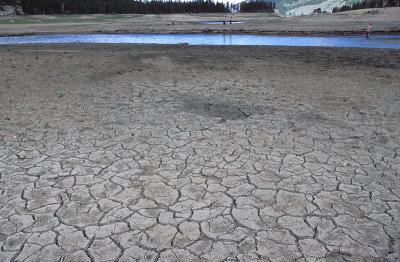As mudanças climáticas e a adaptação da agricultura

[EcoDebate] Diversas pesquisas internacionais indicam que, cada vez mais, os severos impactos que o aquecimento global e as mudanças climáticas terão agricultura, com especial efeito negativo nas zonas tropicais.
É natural, portanto, que o mesmo seja verdade no Brasil. O RS, por exemplo, em 10 anos já enfrentou 5 severas estiagens.
No entanto, surpreendentemente, este é um tema raramente discutido no Brasil, o que é uma insensatez em um país que se orgulha em ser o “celeiro do mundo.
Bem, a pergunta é por que este é um tema tabu? Por que o governo, a EMBRAPA, a CNA, todo o agronegócio, a agroindústria, etc, em geral, fazem de conta que a ameaça não existe?
Devemos nos preocupar com os severos impactos do aquecimento global e das mudanças climáticas na produção de alimentos e na disponibilidade hídrica. É um futuro assustador enfrentar fome e seca em escala global sem estar minimamente preparado para isto.
A ciência, na medida do possível, até está tentando demonstrar a sequencia de eventos e seus possíveis cenários. O problema é que os agentes públicos e a própria população ainda não perceberam que 2050 é logo amanhã…
Visando contribuir para com o debate, sugerimos que acessem o estudo “Adapting agriculture to climate change”, no original em inglês, publicado na revista PNAS e que pode ser compreendido como mais um passo na compreensão deste tema, que poderá ser vital para a nossa sobrevivência.
Abaixo transcrevemos o abstract:
Adapting agriculture to climate change
1. S. Mark Howden*,†,
2. Jean-François Soussana‡,
3. Francesco N. Tubiello§,¶,
4. Netra Chhetri‖,
5. Michael Dunlop*, and
6. Holger Meinke**
+Author Affiliations
1.
*Commonwealth Scientific and Industrial Research Organization, Sustainable Ecosystems, GPO Box 284, Canberra ACT 2601, Australia;
2.
‡Institut National de la Recherche Agronomique, UR874, 63100 Clermont-Ferrand, France;
3.
§Goddard Institute for Space Studies, Columbia University, 2880 Broadway, New York, NY 10025;
4.
¶International Institute for Applied Systems Analysis, Schlossplatz 1, A-2361 Laxenburg, Austria;
5.
‖Consortium for Science, Policy and Outcomes, Arizona State University, P.O. Box 874401, Tempe, AZ 85287-4401; and
6.
**Department of Plant Sciences, Wageningen University, P.O. Box 430, NL 6700 AK, Wageningen, The Netherlands
1.
Edited by William Easterling, Pennsylvania State University, University Park, PA, and accepted by the Editorial Board August 16, 2007 (received for review March 1, 2007)
Abstract
The strong trends in climate change already evident, the likelihood of further changes occurring, and the increasing scale of potential climate impacts give urgency to addressing agricultural adaptation more coherently. There are many potential adaptation options available for marginal change of existing agricultural systems, often variations of existing climate risk management. We show that implementation of these options is likely to have substantial benefits under moderate climate change for some cropping systems. However, there are limits to their effectiveness under more severe climate changes. Hence, more systemic changes in resource allocation need to be considered, such as targeted diversification of production systems and livelihoods. We argue that achieving increased adaptation action will necessitate integration of climate change-related issues with other risk factors, such as climate variability and market risk, and with other policy domains, such as sustainable development. Dealing with the many barriers to effective adaptation will require a comprehensive and dynamic policy approach covering a range of scales and issues, for example, from the understanding by farmers of change in risk profiles to the establishment of efficient markets that facilitate response strategies. Science, too, has to adapt. Multidisciplinary problems require multidisciplinary solutions, i.e., a focus on integrated rather than disciplinary science and a strengthening of the interface with decision makers. A crucial component of this approach is the implementation of adaptation assessment frameworks that are relevant, robust, and easily operated by all stakeholders, practitioners, policymakers, and scientists.
[Por Henrique Cortez, do EcoDebate, 04/02/2009]
Inclusão na lista de distribuição do Boletim Diário do Portal EcoDebate
Caso queira ser incluído(a) na lista de distribuição de nosso boletim diário, basta que envie um e-mail para newsletter_ecodebate-subscribe@googlegroups.com . O seu e-mail será incluído e você receberá uma mensagem solicitando que confirme a inscrição.
Fechado para comentários.